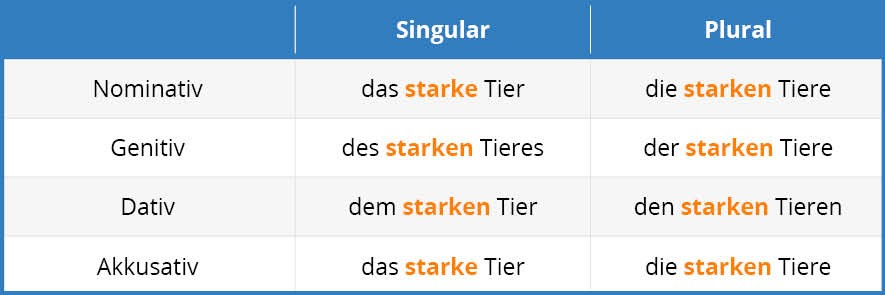

#ADJECTIVE IN GERMAN GRAMMAR FREE#
In each grammatical topic, we present the rules in a concise manner giving examples and providing lots of free exercises. Here, you will find the grammatical rules and structures that are most important for learners.

My wife has a new car - it's very fast. GERMAN GRAMMAR We need grammar to be able to communicate effectively.Using the tables, work out the German for the following sentences: Meine Mutter hat eine klein e Schwester.The correct way to say 'my mother has a little sister' is therefore: For an adjective to describe a feminine noun in the accusative case, the ending you must add to the adjective is -e – so klein > kleine. Complete your sentence using the adjective ending from the table.Follow the table down for feminine/accusative and you’ll see the word for 'a' is eine – so the accusative form will be: Meine Mutter hat eine _ Schwester. Schwester is the direct object of the sentence – literally, the sister is being had by my mother – so we need to use the accusative case.Find the correct column for the gender of your noun – sister is Schwester, which is feminine, so we use the indefinite article eine.Find the correct table (definite article/indefinite/no article) – in this example we are using ' a sister', so we use the indefinite article table.In order to expand this sentence and describe your mother's sister as being small or little – klein – you must follow a specific process. Possessive determiner is a much better term to use it’s a more accurate description of how you actually use these words in German. But sometimes these words are called possessive articles or possessive determiners. the role the noun plays in the sentence, and therefore the case needed Possessive adjectives are words such as my, your, his, her, its, our and their.

Verbs (Usually) Come Second in a Sentence 4. Adjective Endings Must Agree with a Noun’s Gender and Case 3. The ending is determined by the gender, the kind of article used ( der, ein, etc.) and the case (nominative, accusative, dative or genitive). A Noun’s Gender Determines Its Definite Article 2. In German, you have to add an ending to an adjective if it comes before a noun. Remember that das Mädchen is neuter.ģ kein/e/n is being used in this table to show the plural because you can say 'no shoes' – keine alten Schuhe – but not 'an old shoes'.īy using the tables above, you can work out which ending you need to add to different adjectives. 5 German Grammar Rules to Get Beginners up and Running 1. With all other words just add -s, so Mädchen > des schönen Mädchen s (of the beautiful girl). One syllable words and words ending in -s end in -es, so Hund > des alten Hund es (of the old dog). In German, there are two types of conjunctions to know. Conjunctions are the words that connect phrases and clauses together in a sentence. Ģ In the genitive case, with masculine and neuter nouns, you will need to add -s or -es to the end of the word. Gestern means yesterday (time adverb), viel means a lot (manner adverb), and in der Bibliothek means in the library (place adverbial phrase).

Indefinite article - 'ein', 'eine' (a)ĭefinite article – 'der', 'die', 'das' (the)ġ You will need to add an -n to the end of the noun in the dative plural, eg the plural Kinder (children) > den kleinen Kinder n. This chair seems comfy.When you want to use an adjective to describe a particular noun, the tables below will help you to work out the ending of the adjective, depending on the gender of the noun and the case you need to use. The French stative verbs are: être to be, paraître to seem, sembler to seem, devenir to become, demeurer to reside, rester to remain, avoir l’air to seem, passer pour to pretend.Įxamples: Les élèves sont silencieux aujourd’hui. The noun being described is the subject of the sentence and the adjective comes after the verb.


 0 kommentar(er)
0 kommentar(er)
